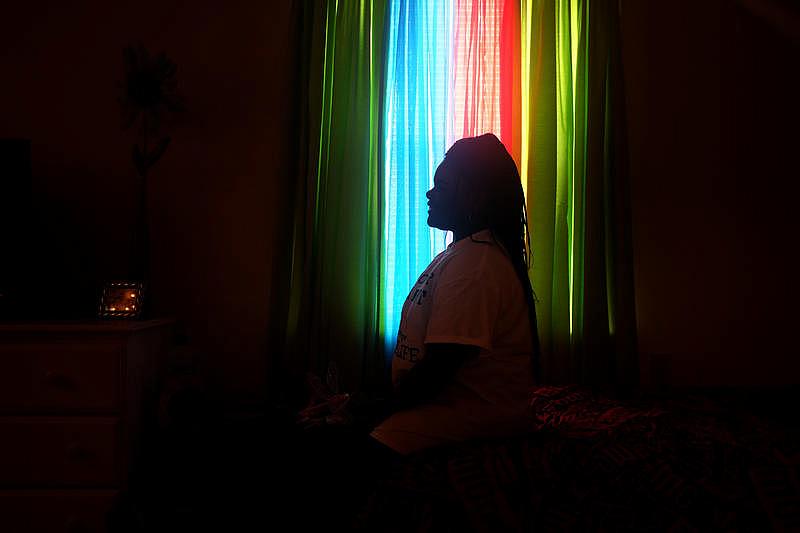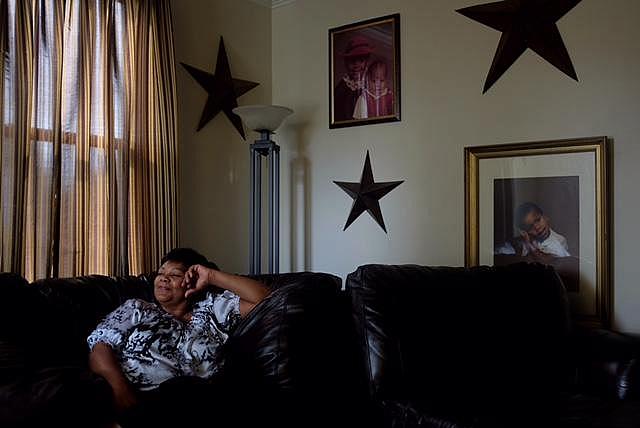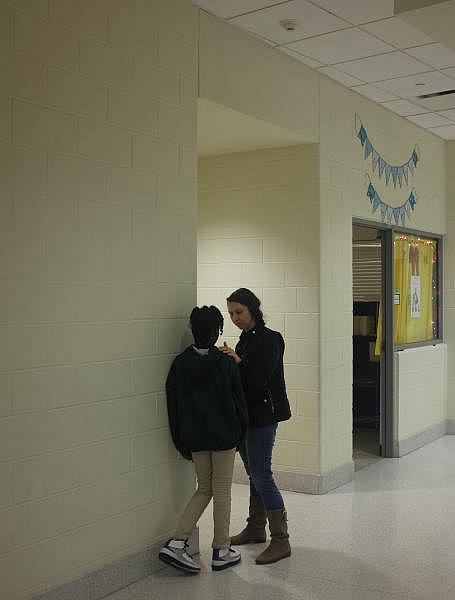For one New Orleans teen, support at school helps with tough times at home
“Kids, Trauma and New Orleans Schools” was produced with support from the Center for Health Journalism at the USC Annenberg School for Communication and Journalism.
Other stories in the series include:
A 'No Excuses' New Orleans charter school has a change of heart

Sherlae is a seventh grader at Crocker College Prep. She used to put her head down on her desk and keep emotions bottled up inside. Then she started meeting with a school social worker.
In our series “Kids, Trauma and New Orleans Schools,” we’ve been reporting about New Orleans kids, how they deal with levels of trauma many times higher the national average, and how schools respond to that.
In Part 1, we laid out why strict discipline can be an ineffective way to reach kids who have experienced trauma. And we met school leaders from Crocker Elementary who are piecing together a new approach.
Today, we meet a student who faces ongoing trauma in her life. We’re not using real names for this teenage girl or her grandmother, to protect the student’s identity.
For more about trauma-informed teaching at Crocker College Prep, check out this story in the Hechinger Report by New Orleans reporter Katy Reckdahl.
Thirteen-year-old Sherlae stands in her bedroom and digs through a desk drawer. It’s filled with pencils and Sharpies. They’re some of her most cherished possessions, because Sherlae loves to write. She fills thick, spiral notebooks with song lyrics and original poetry.
“Most of the time I write my poetry on my bed because it gives me a lot of thoughts right there,” Sherlae says.
Sherlae’s bedroom is pure teenage girl. Light pours in through hot pink and lime green curtains. There’s a special table for all her perfumes and lotions and a life-size doll house where she stores her shoes, mostly bright sneakers and sparkly high tops.
Sherlae opens another desk drawer, stuffed full of paper. “I save all my writing in here,” she says. “Even all my schoolwork. Now I know, now I have to save all my schoolwork in here. Yeah. Because I don’t want my mom to throw it away.”
A couple months ago, Sherlae’s mom stormed into her room, grabbed all her school work and writing, and threw it in a dumpster down the street.
Sherlae’s mom has been diagnosed with bipolar disorder and schizophrenia. Sherlae says sometimes her mom is great. “She takes me to go swimming and we just go ride bikes and have a sunshiny day. And it's like, it'll be fun. It’ll be happy. It’ll be joyful.”
But there are times when she goes off her medication or drinks too much. “She just turns into a different person,” Sherlae says. “And it’s like, do I even know you anymore?”
Those times have been tough for Sherlae, not just at home but at school. Sherlae started kindergarten at a small, Catholic school. But her mom caused so many scenes there, the principal said Sherlae couldn’t come back. The family was left on their own to find another school.
Sherlae had a second mother figure in her life, though. Her grandmother, Marie. Marie has been watching Sherlae since her granddaughter was three. She remembers the little girl having to leave her school. Sherlae “cried so much because she had made some good little friends and everything,” Marie says. "So okay, I'm like 'God, what am I gonna do?'"
It was up to Grandma Marie to find a new school for the girl. She was walking around her neighborhood, distraught about the girl’s education, when she saw a school building. It was Lawrence D. Crocker Elementary. She didn't know anything about it. But Marie went inside, found the principal, and told her about the situation.
“And she said 'baby, you know, you can just bring your granddaughter in the morning,'” Marie says.
Sherlae’s been at Crocker ever since. First grade to seventh.
Sherlae lives with her grandmother, Marie. The two have a close, playful relationship.
Marie and Sherlae sit together at the kitchen table. Marie sets down a blue lockbox and enters a code. It springs open, full of old report cards. These tell a story.
Marie grabs a report card. “Okay, let’s see,” she says. “This is the first report card that she got from the first grade, and it’s from Crocker Arts and Technology School 2009-2010.”
Marie tries to read the grades, but struggles. She pulls out a magnifying glass and holds it up close to her eye. “I’m blind, I’m blind,” she jokes.
Marie shuffles through report cards, mostly As and Bs, until she gets to forth grade.
“That’s when it all started affecting her,” Marie says. “Because the work started getting harder. And the situation with the mom started getting worse.”
In fourth grade, Sherlae and her mom got evicted. Marie took in her granddaughter, and got temporary legal custody. Sherlae’s mom had taken a turn for the worse. She was bouncing in and out of jail and a psychiatric hospital. After being released, Sherlae’s mom would often show up to Grandma’s house, banging on the door.
Sherlae remembers one terrible bus ride home from school. “The bus driver stopped and saw my mama laying down on the ground,” she says. “But I didn’t say it was my mom, so they really didn't know who it was.”
“They thought somebody was dead,” Marie says.
“Yeah, they thought she was dead,” Sherlae says. “And like, the whole bus stopped and most of the kids fell. They pulled down the window and it was like ‘why are you sleeping on the ground? Are you okay?’ And she didn’t say nothing, she was just laying there. And I’m like why?”
Sherlae hid and hoped the other students didn’t figure out this was her mom.
Some kids respond to trauma by disrupting school. Flipping desks. Starting fights. Storming out into the hallways. That behavior can get kids kicked out of class, or suspended. But it also gets attention, can signal that they need help.
When Sherlae’s upset, she completely shuts down. “When you should worry about me is when I’m not paying attention in class,” she says. “Like when I’m laying my head down and going to sleep. Or when I’m just out of it and I’m not focused and I’m just staring off into space."
During those times, she says, she’s thinking about her mom. “Why is she doing this and why is it happening to me?”
Students who go silent often go unnoticed.
“I think she’s a really easy kid to just fly under the radar and to kind of not be on people’s high alert list, and maybe not be seen by a social worker or a counselor regularly,” says Rochelle Gauthier, one of two full-time staff social workers at Sherlae’s school. “Because she’s not a behavior problem. She’s not causing a lot of disruption.”
But she was hurting. Sherlae’s grades plummeted. She had to repeat the fourth grade. Grandma asked the school for help, and Gauthier was assigned.
“I went and pulled her from class, introduced myself, brought her to my office,” Gauthier says.
Gauthier’s office is full of soft couches and bean bag chairs, and there are big, laminated adjectives on the wall: brave, excellent, gentle.
Gauthier describes their first meeting. “Yeah we just kinda talked,” she says. “Like ‘tell me about, you know grandma told me what’s going on. I want to know what’s going on with you. What do you like? What are you interested in? What helps you feel better when you’re upset?’”
“She was just wondering, like, what makes you sad when you’re in class? What makes you not focus in class? What makes you not be happy?” Sherlae remembers.
Gauthier set up regular appointments. They’d talk through feelings and come up with coping mechanisms like writing poetry. “Just ways to express herself when she was sad or upset instead of keeping it inside,” Gauthier says.
Rochelle Gauthier is one of two full-time social workers at Crocker College Prep. She's started paying extra attention to quiet, disconnected students.
Catching those quiet, disconnected kids is gravely important.
“You know, really sadly, kids who struggle with serious depression, who fly under the radar, can end up in the hospital for harming themselves or potentially dead as well,” Gauthier says.
That almost happened to Sherlae.
“My depression about my mom got to the point where one time I said I wanted to hurt myself,” Sherlae says. She’d had an extremely painful interaction with her mom. “She said she didn’t want me around. Like she was saying that she didn’t want me in the world anymore and stuff like that.”
Gauthier made her sign a contract promising she wouldn’t harm herself and got her into more intensive counseling.
Crocker makes a special effort to catch quiet kids like Sherlae. Teachers fill out a form for each student, noting things like whether they get easily distracted or seem overly nervous. Teachers also track students’ behavior. If they notice a big change, they can tell a social worker. And Crocker’s teachers are now trained to recognize signs of trauma.
“Teachers just understanding that like maybe she has her head down and she’s not working, instead of like punishing her, she gets detention, she has to go out of class, we’ve tried to build capacity in our teachers to understand that it may be something else going on,” says Gauthier.
Sherlae is still dealing with trauma. But, Gauthier says, “after three years of getting lots of counseling and support, I’m noticing even as those situations continue to happen at home, she’s developed so many strong skills and has a support network that it’s not affecting her as much as it to used to.”
Last spring, after years of bad grades, Sherlae reached into her sparkly purple backpack and surprised her grandma with a great report card.
“When I first like gave her my progress report I had it behind my back because I was happy in myself,” Sherlae says. “So I had it behind my back to go show her. And she was like ‘who is this for? This is probably for somebody else. Could I see the different name on it?’ But it was my name and everything.”
“I was like, ‘this belong to somebody else.’” Marie remembers. “‘Girl you done brought me home somebody else report card.’ And I look, I'm like 'girl, go ahead on!' Give her a hug and stuff. I said 'keep up the good work.'”
Sherlae wants to keep up the good work. But she knows it’s up to her to stay steady. That great report card was one of the things her mom threw in the trash.
Next year, Sherlae and her grandma will pick out a high school. They wonder if Sherlae will find somewhere as understanding and supportive as Crocker.
[This story was originally published by WWNO.]
[Photo credit Clarence Williams/WWNO.]

